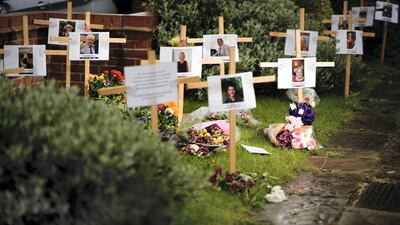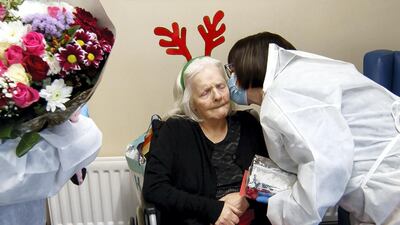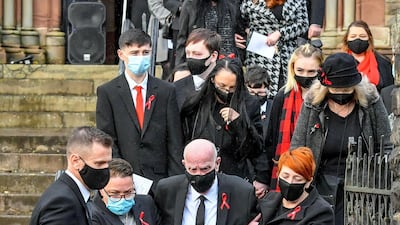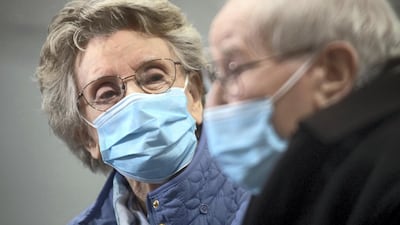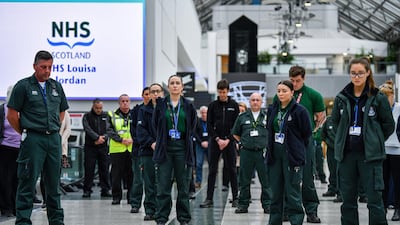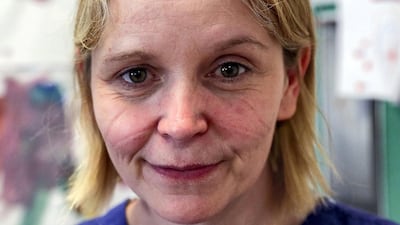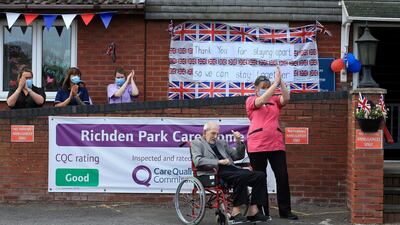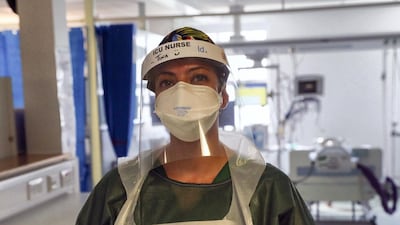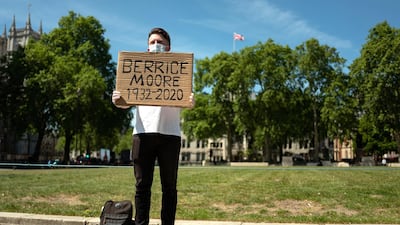Staff on the medical front lines know the grim milestone passed in Britain on Tuesday of 100,000 pandemic deaths does not represent an endpoint for the tragedies of Covid-19.
Medics, experts and support workers said more people would die and suffer.
But all stressed their determination and belief that the system would ultimately not be overwhelmed by the scale of the pandemic.
“We know staff and patients are dropping [dead] but we will fight even harder to get through this,” one front line medic said.
“Our level of work won’t drop off because people don’t just suddenly get better because we’re over the peak. We know many will die over the coming weeks and that’s something we have to deal with.”
In searching for explanations, the workers traced faults back to the fact that travellers from the first countries to suffer an outbreak had been allowed into Britain, then roamed without restriction.
As the World Health Organisation warned of the new disease, more than 2,000 people were arriving directly from Wuhan in China.
That decision was among the many reasons that Britain is the first European country to suffer more than 100,000 deaths from Covid-19.
Blame has also been placed on the lack of political leadership, dithering over lockdowns, high-profile rule breakers, lack of money in the National Health Service or a failure to call in the military early enough.
Others suggest that while Britain has suffered high fatalities, others countries are likely to catch up and there has been a certain amount of bad luck.
In March, Imperial College London modellers suggested 250,000 people might die – a figure that could prove close to the truth.
The only hope was that the UK's vaccine programme could pull it out from the dark place.
Scientists rapidly produced a homegrown vaccine, having started work immediately after receiving a genetic model of the coronavirus early in January last year.
Not long after the research began, the first Covid-19 cases appeared in the UK.
UK dithered while other nations acted
Despite the dramatic rise in infections and deaths in Wuhan, UK sports events and conferences went ahead and London’s commuters jammed into Underground carriages.
While the rest of Europe entered into hurried and strict lockdowns, Britain carried on as normal – the island mentality, perhaps, thinking it was largely immune.
On March 11, thousands of Atletico Madrid fans were allowed into Liverpool for a Champions League game.
They had left behind a country where crowds were banned from stadiums as Covid-19 ripped through the Spanish capital, killing 3,500 in the month.
That same week, the Cheltenham festival went ahead with 300,000 racegoers attending over four days. The punters came from far and wide and the virus took the opportunity to leap from person to person.
By the time Prime Minister Boris Johnson brought in a full lockdown on March 23 there had been 331 deaths. Six weeks later the death toll passed 30,000.
But at least there were signs that the government's plan was working. Deaths dropped to about 100 a day and the pressure grew to reopen schools, restaurants and shops to get the economy operating again.
Despite Britain's senior scientists saying the country was facing a "very dangerous moment", by June schools had largely reopened and the government was applauded for its Eat Out to Help Out policy by paying for half of the price of meals in restaurants.
Holidaymakers flocked to Europe, beaches were packed and the young frolicked in the summer sunshine. But there were warning signs.
In late July, all travellers in Spain were told to isolate themselves on return to Britain after cases in the Mediterranean nation rose sharply.
Others countries followed and reports of a second wave hitting Europe led to more panicked lockdowns across the continent.
But not in Britain. Children went back to school even as Mr Johnson warned of a second wave.
Caught between keeping the economy's heart beating and preventing the spread of the disease, the government opted for a middle ground, with new piecemeal restrictions including a 10pm curfew on restaurants.
It would not be enough, said Britain’s chief scientific adviser Sir Patrick Vallance to prevent 50,000 infections and 200 deaths a day in November if nothing were done.
His prediction on infections was accurate but on deaths it proved to be a considerable underestimate.
In late summer, a leaked government document said that in a “reasonable worse-case” scenario the country would experience 85,000 deaths over winter.
At that point, Britain had recorded 41,000 fatalities and it seemed an outlandish assessment. Now it is just 26,000 deaths away from that seasonal total.
Those in the NHS who knew how deadly Britain’s winters could be realised a flood of infections would swamp the UK’s 4,000 critical care beds.
Tier system fails to keep infections at bay
Desperate to keep the economy running, the government introduced a 'Tier' system, which brought localised lockdowns to many parts of northern England where the disease had spread rapidly among households.
The bitter negotiations over funding packages for cities such as Manchester were swiftly forgotten when infections passed one million on October 31, heralding a second national lockdown in England.
When that ended, the country returned to another tier system and thoughts turned to at least having a decent Christmas after such a tough year.
A five-day partial lifting of the lockdown was promised, with a guarantee that all schools would open in January.
New Covid strain cancels Christmas
On December 14, Parliament was told that a new strain of coronavirus had been found in southern England, leading to a rapid rise in cases.
Within three days, the daily number of infections went from 20,000 to 35,000, and by the end of the month was passing 50,000.
Reports of parties and family and friends mixing over the festive season did not augur well for 2021.
The schools did reopen but only for one day, on January 4, when 58,000 new cases were reported. Four days later the number of daily infections hit a record of 68,000.
A third national lockdown was imposed in England in the knowledge that the growing number of infections meant an inevitable torrent of deaths a few weeks later.
The daily death toll went from about 500 a day in early January to its current average of 1,200, leading to Britain experiencing an astonishing 27,000 Covid-related deaths in less than a month.
The half-baked lockdown measures and scientific advice that was only partially heeded took their toll.
It was a chastening experience for the government, which had seized on the redemption offered by the rapidly approved Pfizer/BioNTech and Oxford/AstraZeneca vaccines.
Health Secretary Matt Hancock ordered 350 million doses from seven potential vaccines in the summer. So far, more than six million have been given.
Too soon to say if UK death toll is a dire outlier
At the same time, Britain has the highest daily death rate in the world, with 18 for every one million people.
Salvation for the government has arrived but at great cost. Could that scale of death whereby Britain’s toll is double that of Germany or Spain have been avoided?
To some, the virus is so transmissible that in the end there was little any government could have done to change the outcome.
“It’s not a good question to ask at the moment,” said Prof Graeme Ackland, professor of computer simulation at Edinburgh University.
“It’s a little bit like a football manager saying, ‘You’re one down at half-time, why have you done so badly in this game?’
"It may be that the vaccine brings it to a fairly abrupt end. But if it runs for another two years then probably all the countries in Europe will end up looking pretty similar.”
Others blamed the belated lockdowns, failure to close the borders and poor leadership, and media pressure making the government open up from lockdown too early.
“From early on, scientists were trying to get messages about the pandemic’s severity to the higher political decision-making levels but there was not a high level of interest in the pandemic plan,” said Dr Ilan Kelman of University of London.
“By looking at Australia or New Zealand and how early they responded with what seemed like horribly severe measures, and yet look at where they are now compared to Britain.”
A senior nurse said in future the military should be quickly called in to help.
“We need to ask for help earlier. We need to stop worrying about our reputation by calling in the military and start mobilising our contingencies a lot earlier.
"Now all the requests for military aid are flying in but they should have been done in October. Hospital chief executives should also be given the authority to bring in troops to help."
In every country mistakes have been made but it appears there were more in Britain than elsewhere and they cost lives.
Yet with more than 37,000 Covid-19 patients in UK hospitals, the pandemic is far from over and the infection rate and death toll will continue to rise.
Only when people stop dying from Covid-19 will we finally be able to answer the question of "what just happened?"
_________________________________________________
